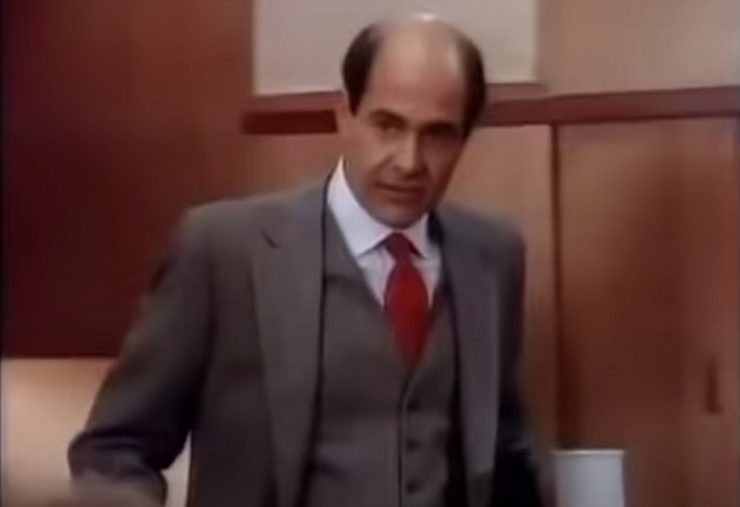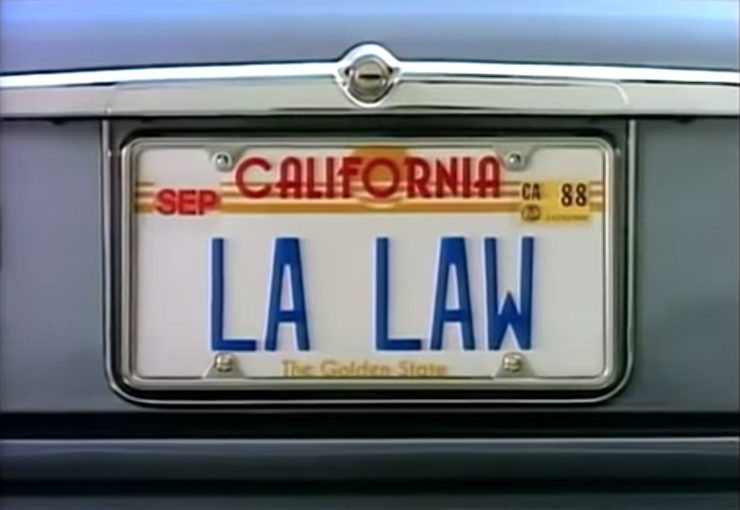Welcome to Close Reads! In this series, Leah Schnelbach and their guests dig into the tiny, weird moments of pop culture—from books to theme songs to viral internet hits—that have burrowed into our minds, found rent-stabilized apartments, started community gardens, and refused to be forced out by corporate interests. This time out, Andrew Schenker takes us back in time to a faraway land called Los Angeles, where a plucky lawyer presents us with a terrifying vision of the future in the form of a cellphone.
When it comes to technology, I’m most certainly a late adopter. I bought my first cell phone, a Nokia flip model with a pay-as-you-go plan, in 2003, and it was nearly another decade before I gave in and got my first smart device. I always tended to look at new technological advances as novelties that didn’t really have anything to do with me, not worth my attention since they would soon go away. When, inevitably, they wouldn’t, only then would I reluctantly buy in.
This reluctance is partly attributable to personality and partly to the transitional era I grew up in, which is to say, the 1990s. For at least half of the decade, I managed to get away without learning how to use a computer. (This ended in 1996, when I was the only person in my 11th grade English class to turn in a hand-written essay; the teacher made me take it back and type it up.) As for making phone calls when I was away from home, I was content to rely on that old standby, the pay phone, often used in conjunction with such helpful and now-obsolete services as 1-800-COLLECT. When in the middle of the decade, my parents got their first cellphone, I took it with me on long car rides in case of emergency, but it was hard to view it as anything more than a small convenience which was never destined to play other than a minor role in my life. Growing up in the ‘90s, it was possible to look at it that way.
In at least one instance, though, the cell phone did play a significant part in my imaginative life, and this moment came courtesy of the TV show L.A. Law.
As a child, L.A. Law—a legal drama equal parts ripped-from-the-headlines social commentary and trashy soap opera—was my favorite show. This was perhaps an odd choice for a pre-teen, but something about the high-toned lifestyle carried out under the warm California sun seemed eminently enticing to my snow-bound suburban soul. The world the show depicted was equal parts comforting and the exciting. The lives of the lawyers offered an appealing atmosphere of good-life-living but not one too glammy to be radically at odds with my own sedate upbringing. At the same time, it represented a vicarious entry into a grown-up world that was a little bit dangerous but, hemmed in by the limits allotted by network television, never too dangerous to tip over into the discomfort that comes from actual adult living.
Obsessed with the show between the ages of ten and thirteen, I would tape the reruns that TNT aired every weekday afternoon, in addition to each new episode every Thursday night. While I was skeptical about most forms of technology, there were at least a few that I readily embraced: Not only did I commandeer the family VCR every chance I got, but I took it much further. Hooking my parents’ camcorder up to the entertainment system, I would transfer the footage to 8 mm tape. Then, using the camera’s editing function, I would splice together my favorite moments from each season’s title sequence into a kind of supercut credit roll. I was a true L.A. Law geek.
***
Originally airing on February 9, 1989, “The Plane Mutiny” was the 10th episode of the show’s third season. The episode’s A plot, which provides the punning title, charts the thwarted efforts of Douglas Brackman, the law firm’s managing partner, to fly to Chicago to woo a potential client. Always scavenging for new financial opportunities for the firm, Brackman hears about a company in that town facing a hostile takeover and hops on the next plane to offer his representation. Due to a mechanical error, though, the plane can’t take off and the passengers sit moored on the runway for hours. When Brackman’s demands that he be let off the plane so that he can make other arrangements are sternly rebuffed by the captain (who goes so far as to threaten him with death by firearm) he despairs of making the meeting. That is, until he remembers that the woman sitting next to him has a cell phone.
The phone in question is a typically cumbersome late ‘80s specimen, not quite as thick as the grey DynaTAC model that still lingers in the popular imagination as a potent decade signifier, but an only slightly slimmer black model complete with sprouted antenna. We see it just once, earlier in the episode. After the flight attendant first announces the delay, the woman pulls it out and makes a call, but the camera quickly shifts away from her and follows Brackman as he stands up and pumps the attendant for further information. By the time he sits back down, the woman is just putting it away. The phone’s later star turn happens entirely offscreen.

After Brackman is put in his place by the captain, he returns to his seat. “I admire your nerve,” the woman tells him once he’s settled back in, “even if it didn’t work.” Brackman doesn’t miss a beat. “Let me borrow that phone of yours,” he replies, “and I’ll make a call that will.” The scene ends there, but when the storyline picks up again, we see one of the firm’s associate lawyers, Jonathan Rollins (Blair Underwood), in court, explaining Brackman’s situation to a judge. This sympathetic jurist, who has clearly found himself in a similar situation before, doesn’t take much convincing and issues an order to free the passengers from the plane. When he disembarks, Brackman is promptly arrested for “reckless endangerment, interfering with a flight crew in the execution of their duties,” and, the kicker, “use of a cellular phone aboard an aircraft,” but his ploy ultimately yields results. Not only does he land the Chicago client when they hear about the incident and are impressed by his aggressiveness, he ends up securing a date with the cell phone owner.
***
L.A. Law was a popular and critical success in its day, running for eight seasons and taking home 15 Emmys. Its fusion of prime-time soap and engaged social drama hit that sweet spot that turned what could have been a guilty pleasure into a respectable Thursday night activity. Watching the show today, it seems both quaint, lacking the cinema-level production values and psychological depth that would characterize the coming generation of prestige dramas, and hugely, almost effortlessly, entertaining. Before quality drama migrated to cable and then to streaming and had to try so hard, a show like L.A. Law embodied a mode of serious television that didn’t feel the need to lapse into self-seriousness.
Buy the Book


The City Inside
For me personally, there’s plenty of nostalgia wrapped up in the show, taking me back as it does to a simpler time in my own life. When I first saw “The Plane Mutiny,” the cell phone seemed like a visitation from another world. I had certainly never seen anything like it and it felt like something entirely apart from the known universe. This phone, I was sure, had nothing to do with me and never would. Viewing the episode today, of course, the whole thing strikes me quite differently, registering as a sort of pivot point in contemporary culture. Seeing the woman pull out her mobile device on the plane brings us back to a time where we were just beginning to become connected in a way that would soon become unrecognizable to the 1989 viewer. Brackman’s intervention represents an early but definitive gesture in the use of mobile technology to both remain constantly in contact with the world and to impose yourself rudely upon it.
L.A. Law comes to us from a very different era in the nation’s cultural history, one in which the now primitive-seeming technology on display in the show was mirrored by an equally outdated model of TV distribution. Soon further technological developments would help render both shows like L.A. Law and the environment they depict as hopelessly obsolete, but that doesn’t mean there isn’t value in contemplating what we’ve lost. Besides being a charming slice of late ‘80s nostalgia, “The Plane Mutiny” represents an instructive moment in the ongoing development of American popular entertainment. Revisiting the episode, we can either bemoan the unavoidable sense of obsolescence playing out on our screen or embrace it, but whether we’re watching it on cable, on our DVD player, or (as I recently did) on a video sharing platform, the question becomes unavoidable, the whole conundrum concentrated into the body of a simple but highly sophisticated object, 12 ounces of metal and circuits that appear on the screen for no more than a few seconds but change everything.
Andrew Schenker is a critic and essayist who lives in Upstate New York.










